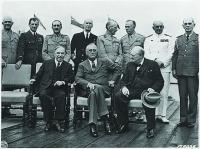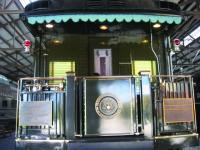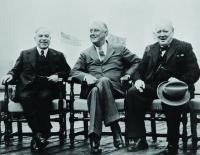
Chief Marshal Portal, General Alan Brooke, Admiral Ernest King, Field Marshal Sir John Dill, General George Marshall, Admirals Pound & Leahy; front, Mackenzie King, Franklin Roosevelt & Winston Churchill at Quebec Conference, Canada, 18 Aug 1943.

President's Canadian Train Car

Canadian PM Mackenzie King, FDR, British PM Churchill, First Quebec Conference 1943.
THIS WEEK, 70 years ago, Prime Minister Sir Winston S. Churchill and President Franklin Delano Roosevelt, the combined Joint Chiefs of Staff of the U.S. and U.K. and numerous political, military and naval advisors were concluding the First Quebec Conference.
As he was dining at the Prime MinisterÙs residence on 10 Downing Street, in London, on the evening of August 4, the Prime Minister was informed that Brigadier-General Ord Wingate, Commander of the "Chindits" had arrived. The Prime Minister invited him to join him at dinner. After a half hour of conversation, the Prime Minister decided to take him to Québec and informed him that the train to the River Clyde, where the Queen Mary awaited them, would be leaving in an hour.
Wingate had only just arrived after three days’ flight from India. He protested that while he would like to accompany the Prime Minister to Québec, he would also like to see his wife who was at her home in Scotland and he had no other clothes. The Prime Minister had Mrs. Wingate contacted by the police and taken to Edinburgh, with some clean clothes for her husband, to join the train. The Prime Minister also invited Wing Commander Guy Gibson, he of the "Dam BusterÙs" fame. In addition, Mrs. Churchill and their daughter, Mary, accompanied them, along with more than 200 admirals, generals, ministers and other functionaries, and 50 Royal Marines.
The Queen Mary sailed from its berth on the River Clyde on August 5, bound for Halifax, Canada. Upon arrival on the North American continent, on August 9, the British party immediately boarded a train for Québec.
On Friday, August 12, the Prime Minister and his daughter traveled, by train, to visit the President and Mrs. Roosevelt at the Roosevelt family estate at Hyde Park, on the Hudson River, in New York. Mrs. Churchill and the rest of the party remained in Québec. The Roosevelts and Churchills were joined by W. Averell Harriman and Harry Hopkins. The Churchills departed Sunday morning for Québec, and the First Lady flew to the West Coast, on Sunday afternoon, where she was to catch a flight to Guadalcanal to visit the troops. On the evening of Monday, August 15 the President returned to Washington, by train, arriving at 7:45 A.M. the next morning.
The President, Hopkins and Harriman boarded the train, in Washington, and departed at 8:20 P.M., bound for Québec, on August 16, arriving at 6:00 P.M. the next day. The staffs had been there, busily working, for a week. The President and the Churchills stayed in La Citadelle, on the heights of Cape Diamond, overlooking the St. Lawrence River. Everyone else stayed at the Hotel Château Frontenac, also overlooking the river, where most of the meetings were held.
Churchill and Roosevelt had agreed, in July, to meet in Québec. They then had to convince the Canadians to host the conference - but not participate! FDR, especially, was concerned that, if Canada participated, they could not say "No" to Brazil, México or any of the other countries that had declared war against the Axis and were participating in even a small way. The British were concerned that if Canada participated, their other Dominions, such as Australia, New Zealand and South Africa, would demand participation.
The fact that the staffs were there a week early, didnÙt mean that they were accomplishing much - at least until the ice was, literally, broken - after a gun battle! British General Alan Brooke, Chief of the Imperial General Staff and his American counterpart, General George C. Marshall, U.S. Army Chief-of-Staff, did not like each other - at all. The irascible Chief of U.S. Naval Operations, Admiral Ernest King, threatened to hit one of the British Allies.
Admiral Lord Louis Mountbatten, Chief of Combined Operations, had requested permission to update everyone on the highly secret "Project Habakkuk," on August 19. Someone, on the British side, had conceived of aircraft carriers to be fashioned from the large chunks of ice floating in the North Atlantic, in order to expand the range of the Allied antisubmarine air coverage in that area. One of Lord MountbattenÙs aids, Geoffrey Pyke, further refined the idea by inventing "Pykrete"- a frozen combination of seawater and wood pulp.
As all of the aides were ushered out of the room, a chunk of ice and "Pykrete" were wheeled in, together with an ax. Lord Mountbatten handed the ax to U.S. Army Air Forces Chief, General "Hap" Arnold, and told him to take a whack at the ice. The General knocked a big piece of ice off. Then Lord Mountbatten told him to take a whack at the "Pykrete." When he did, he almost tore his arm off, and had no effect on the "Pykrete." Next, Lord Mountbatten pulled his pistol and fired at the ice, spraying pieces over those in attendance. The British Lord wasnÙt through. Next, he fired at the "Pykrete." The bullet ricocheted off the substance and whizzed around the room like an angry bee, grazing Admiral KingÙs leg.
Meanwhile, the aides outside the room, knowing the hostile attitude the two sides had toward one another, had been crowding around the door listening to the commotion, and the shots. Concerned when they heard General Arnold hitting the ice and "Pykrete," they really became worried when they heard shots being fired! But when they piled into the room, they found that the ice truly had been broken amongst the participants and the conference proceeded much more smoothly from that point forward.
The following decisions were made by the two English speaking Allies: (1) The date for the Invasion of France was firmly set at May 1; (2) an American would command the Troops; (3) a new theater was created - China-Burma-India (CBI), under the command of Admiral Lord Mountbatten; (4) a secret accord was reached on the development and use of nuclear weapons; (5) inspired by General WingateÙs presence, the Americans resolved to create their own behind-the-lines, long-range, strike-force for use in the Burma Jungle, which came to be known as "MerrillÙs Marauders," under the command of Gen. Frank Merrill.
The Conference concluded on August 24. After a few days of rest, the PM and his wife, Clementine, drove to Lake of Snows for some fishing. On August 29, they returned to Québec. Two days later, Churchill addressed the Canadian people on radio, leaving shortly thereafter for Washington, where he enjoyed the hospitality of the White House. He was accompanied by, among others, First Sea Lord, Admiral of the Fleet Sir Dudley Pound. While at the White House the Sea Lord tendered his resignation, because he had suffered a stroke, and knew that he was no longer as sharp as he once was - or needed to be. The Admiral would be dead in two months.
On September 8, the PM and party traveled by train from Washington to Hyde Park, where they, again, visited with the President. The PM and his party departed by train, on the evening of the 12th, arriving in Halifax on the 14th. From Halifax, the British leader and his entourage crossed the Atlantic aboard the battleship HMS Renown.
A second conference was held in Québec the following year with most of the same participants.
NEXT WEEK: BRITISH EIGHTH ARMY LANDS ON THE ITALIAN MAINLAND AND ITALY SURRENDERS
Mr. Wimbrow writes from Ocean City, Maryland, where he practices law representing those persons accused of criminal and traffic offenses, and those persons who have suffered a personal injury through no fault of their own. Mr. Wimbrow can be contacted at
http:/wimbrowlaw@gmail.com


